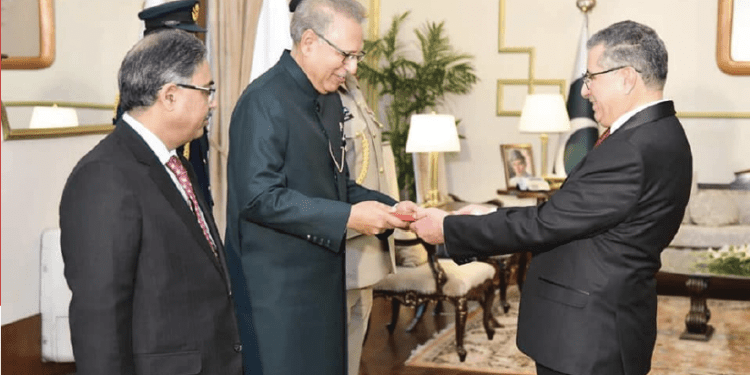Embark on a diplomatic journey as we delve into an exclusive interview with the Ambassador of Tunisia to Pakistan H.E Mr. Borhene Ei Kamel. Uncover the historical tapestry of their enduring relationship, exploring not only political ties but also the untapped potential in tourism, trade, and cultural exchange. From the echoes of support in Tunisia’s liberation movement to envisioning a future entwined through education and economic cooperation, this interview unveils the ambassador’s perspectives on crucial global initiatives like the Belt and Road Initiative and shared responsibilities in addressing the impacts of climate change.
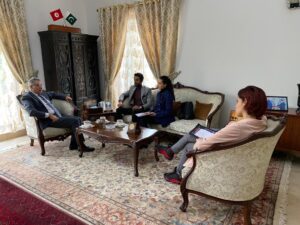
Delve into the heart of this engaging conversation for a comprehensive understanding of the evolving relationship between these two nations:
1. The diplomatic relations between Tunisia and Pakistan were established in 1957, the first Pakistani embassy in Tunisia opened in 1958, and Tunisia introduced its embassy in Islamabad in 1980. It has been a long relationship between both countries. How would you evaluate the relationship between both countries, and which have been the major accomplishments so far?
As you mentioned, Pakistan was one of the nations that supported our liberation movement, specially within the United Nations. We gained our independence from France in 1956, and as you said, we formally established diplomatic ties with Pakistan the following year, in 1957. Therefore, it was among the first nations with which Tunisia established diplomatic ties. In 1958 Pakistan established an embassy in Tunis, capital of Tunisia, and it took us longer to open our embassy here in Islamabad in 1980. As a result, we have extremely effective political relations, and there is cooperation between the two nations, particularly in international forums, primarily the Organization of Islamic Cooperation and the United Nations, to both which we belong. Unfortunately, I believe that positive political connections are not reflected in the economic and cultural ties.
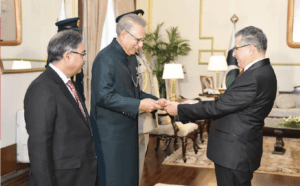
Therefore, there is plenty of potential to strengthen our economic ties and bring our people closer together. In my opinion, the main obstacle limiting the growth of connections between our two countries is that we don’t know each other, our culture and traditions; perhaps it is the geographic distance separating our two nations, but we still need to do a lot of work to know each other better. Pakistan is at the easternmost tip of the Islamic world, and Tunisia is at its western edge. And I think it’s important to bring people together. And that is the primary goal of our work here in Islamabad.
2. Tunisia is a beautiful country with great heritage, multiple influences due to its location. To the north you have the Andalusian, Turkish and Italian influences, to the west you have roman ruins, and to the east, Muslim heritage. It is clear that Tunisia has a lot to offer in terms of tourism. What Tunisia is doing to push tourism and culture from Pakistan and what do you think Pakistan can do to attract tourism from Tunisia?
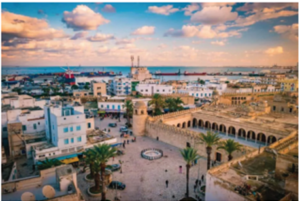
Tunisia is a relatively small country compared to countries like Algeria and Libya, as well as Pakistan. We made significant contributions to the Overall human civilization. Tunisia’s history may go back more than 50,000 years. The first known civilization in Tunisia was known as the Kapsa civilization, which precedes the name of a modern city in the country’s center, Carthage. Africa Vetus, later known as the Roman province of Africa, once included Tunisia. The ancient site of the city of Carthage is close to Tunis, the capital of Tunisia. Tunisia is heavily influenced by Italian traditions, and because of the country’s close ties to Italy, you may find many similarities in both culture and language. So, we have a lot to offer in terms of tourism and culture, and we are trying to share this with Pakistani people, so they are more interested in visiting Tunisia. On the other side, unfortunately, due to the media’s constant negative portrayal of Tunisia and Pakistan, there is not a lot of tourism from both sides.
However, there may be a lot of potential for tourism between Tunisia and Pakistan in the future. To achieve this, however, we must first become familiar with one another’s cultures. Even though we share the same religion, our cultures are very different from one another.
cooperation to assist the country with olive tree plantation, and we hope to be able to export more olive oil to Pakistan in the future. We need to work on trade corporations and promote the potential of trade between Pakistan and Tunisia because we don’t have a direct link to trade between the two countries, most items flow from the United Arab Emirates and third parties.
For that reason, we must develop trade. We are encouraging business people to participate in exhibitions, visit the countries and see themselves the opportunities, because direct contact is better to gain trust. Tunisia is one of the biggest exporters of textiles to Europe, so there is a lot of potential for Pakistan to increase its exports to Tunisia as well.
3. Tunisia is the world’s second-largest exporter of dates and olive oil. Additionally, Pakistan has a huge market for those products. Pakistan became the world’s 12th-largest importer of olive oil in 2020 after importing 6.6 million pounds of it, however, the olive oil is primarily from Spain, Turkey, UAE, and Italy. Moreover, Pakistan imports 11,7 million dates in 2010, making it the world’s 31st largest importer, but dates largely come from Iran, Saudi Arabia, the United Arab Emirates, and China. What do you believe is taking place? What must be done in order to boost the amount of those products imported from Tunisia? What possibility do you see today to increase trade, cooperation, and investment?
We don’t export much to Pakistan because 80% of our goods are exported to Europe and 20% is exported to the rest of the world. However, we are trying to help Pakistan to expand their olive production, we have currently a technical cooperation to assist the country with olive tree plantation, and we hope to be able to export more olive oil to Pakistan in the future. We need to work on trade corporations and promote the potential of trade between Pakistan and Tunisia because we don’t have a direct link to trade between the two countries, most items flow from the United Arab Emirates and third parties. For that reason, we must develop trade. We are encouraging business people to participate in exhibitions, visit the countries and see themselves the opportunities, because direct contact is better to gain trust. Tunisia is one of the biggest exporters of textiles to Europe, so there is a lot of potential for Pakistan to increase its exports to Tunisia as well.
4. What are the main projects that Tunisia is currently working on with Pakistan?
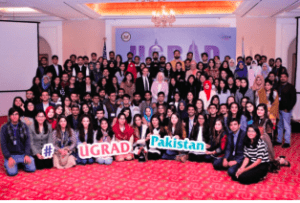
We are working to strengthen our ties with Pakistan in the areas of trade and the economy because Tunisia is the gateway to Africa and Europe, and on the other side Tunisia can use the help of Pakistan to conduct business with the rest of Asia as well. We also want to engage in cultural exchange with Pakistan; in Tunisia, there are multiple international cultural events, and we invite many artists from around the world to perform there. Many Tunisians are familiar with Nusrat Fateh Ali Khan because he performed at the Carthage Festival in Tunisia, so we would like to have more artists participating in these festivals so Tunisian people gets closer to Pakistani culture. Also, in terms of education, we have a large number of Pakistani students who are studying Arabic and religion in our school The Ez-Zitouna University in Tunisia, founded in 737 AD first as a Madrasa then as an institution, is the oldest university still in existence today, and many of the deans of our institution are Pakistanis, thus we cooperate with Pakistan in this sector.
5. Tunisia is the smallest nation in all of Africa, but it is seen as a gateway to the African movement and one of the top five largest nations in Africa. Currently, Tunisia considers BR1 as a chance to increase trade and investment with China as well as other African nations. Additionally, Pakistan’s positive relations with China and CPEC have facilitated increased cooperation. Can you provide additional information about the existing BRI project in Tunisia and how you believe it has positively impacted the nation and trade in the area with Pakistan if that is the case?
The relationship between Tunisia and Asia are not yet developed, but we have a lot of good relationships with Japan and Korea. Last month, we organized the Tokio International Conference for African Development, which benefits Tunisia.Japan is the country that invests the most in Tunisia, but we also cooperate with it on trade. Approximately twenty or thirty years ago, we started developing good relationship with China because it has a large market to export textiles, but today we can’t compete with China, Pakistan, and Bangladesh. But through BRI we are developing more our relationship with China as this project offers a lot of possibilities for the Tunisian market and for investing in Pakistan for Tunisian businesses. We want to cooperate with the entire Asian market, and Pakistan is a significant nation to establish trade connections
6. The globe is suffering a climatic crisis, 1/3 of Pakistan was under water even when the county’s does not contribute to mor than 1% of carbon emissions. The same situation in Africa, even though Africa’s 54 states have not contributed to the increasing global emissions the continent is one of the hardest hits. Desertification, dust storms, rising sea levels, extinction of the Lake Chad is a great example. Agriculture is being affected losing 5% to 15% of growth.
It’s a significant challenge for Pakistan and Tunisia, both of which are impacted by climate change. Tunisia also experiences many negative effects from a lack of rain, which has an impact on our agricultural sector. We also experience problems with the sea level, which has an impact on cities that are close to the sea and coastal regions. Third, we experience problems with the desert, which are aggravated by sand from the south. As you mentioned, we don’t contribute to carbon emissions, but we are the victims of climate change. We need to work on this. We actively participated in COP27 and we have requested the international community to address this problem because Tunisia and Pakistan alone can’t address that problem, but we can address these problems through international cooperation.
7. Pakistan and Tunisia are actively taking part in COP 27. What do you think Tunisia’s major message to the Summit is? What is Africa’s primary objective? What possible impact do you think the summit’s Tunisia-Pakistan relations may have?
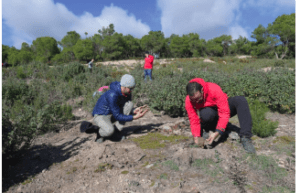
We are stressing more about tree plantations, and we need to promote it across the globe, especially in schools. We are still attempting to grow more palm trees and produce more dates in the southern part of the country, where we have the greatest quality dates in the world, and our output is also affected by the rising sand level. We now see many projects happening, such as the one developed by the Pakistani former Prime Minister Imran Khan’s billion tree project in Pakistan, and also the Saudi Arabia’s green initiative, these initiatives will help reduce emissions.
The interview was previously published in the Winter 2023 Issue of the Magazine ” The Changing World”
For more updates on Tunisia, follow the account of Tunisia in Pakistan

